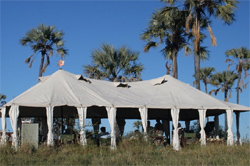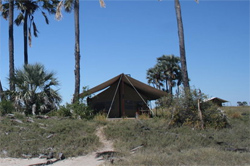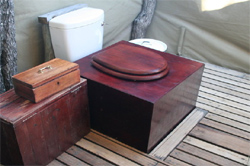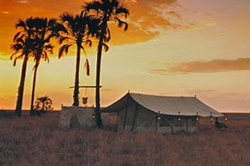
Welcome To San Camp
San Camp is located amongst scattered clusters of palm trees on a grass covered bay that overlooks the endless white salt sea of the extinct Makgadikgadi superlake. This area is located deep in the Kalahari Desert on the edge of the Makgadikgadi Pans, the largest saltpans in the world which directly adjoin the National Park.
This is an extremely fragile environment filled with fascination and interest. The management and guides have an approach of maximum care for the environment, and this is a destination for the true lover of remote experiences.
Accommodation Prices at San Camp
Discounts may be available for children sharing with adults, please specify the ages and number of children when making your booking or requesting a quote.
San Camp Prices 2025 and 2026
| January 2025 - December 2025 | ||
|---|---|---|
| Accommodation | Per Person Sharing | Single Rate |
| Twin Tent | Please Enquire | Please Enquire |
| Double Tent | Please Enquire | Please Enquire |
Accommodation at San Camp
4 Twin and 2 double tents with en suite bathrooms and spacious verandah. The tents offer lots of space and the décor is stylish. You shower under the stars here using bucket showers - there's no running water or electricity, but somehow, in this immense nothingness, even a hot shower seems like an incredible treat.
What To Do at San Camp
During the summer months (November to April) the focus is on the thousands of zebras which have migrated from the Boteti River and Makgadikgadi Pans National Park immediately to the west. During these same months, the pans fill with water and attract numerous species of birds from flamingos to wattled cranes and pelicans. During the dry, or winter months, the migrations move westwards to the water available in the Boteti River but many desert-adapted creatures remain resident.
This is the domain of the brown hyaena, a shy and elusive creature, as well as suricates, aardvarks and small bustard species. Ralph Bousefield and his guides have made many important finds in the field of palaeontology, with stone implements and other evidence of Stone Age dwellers.







